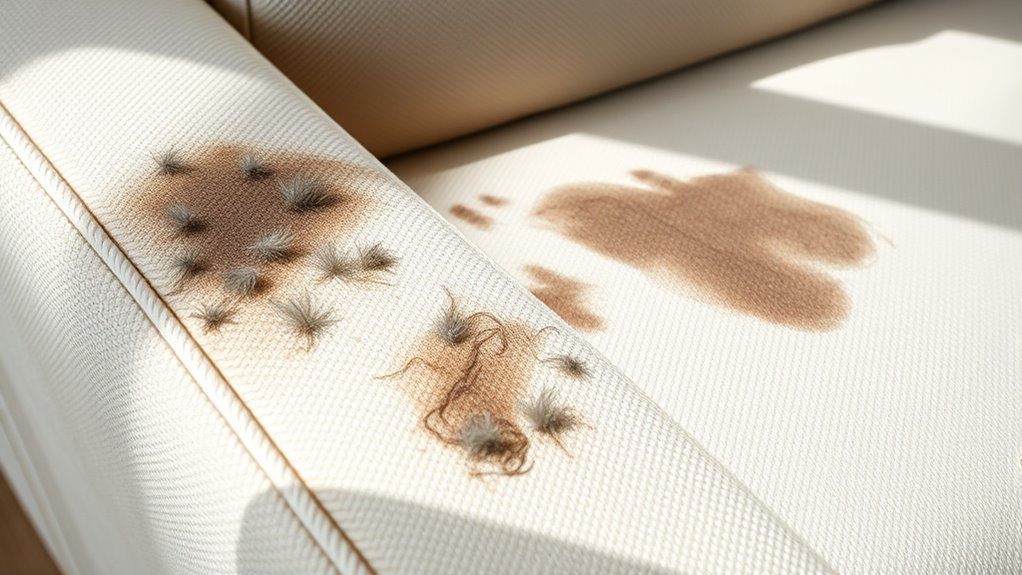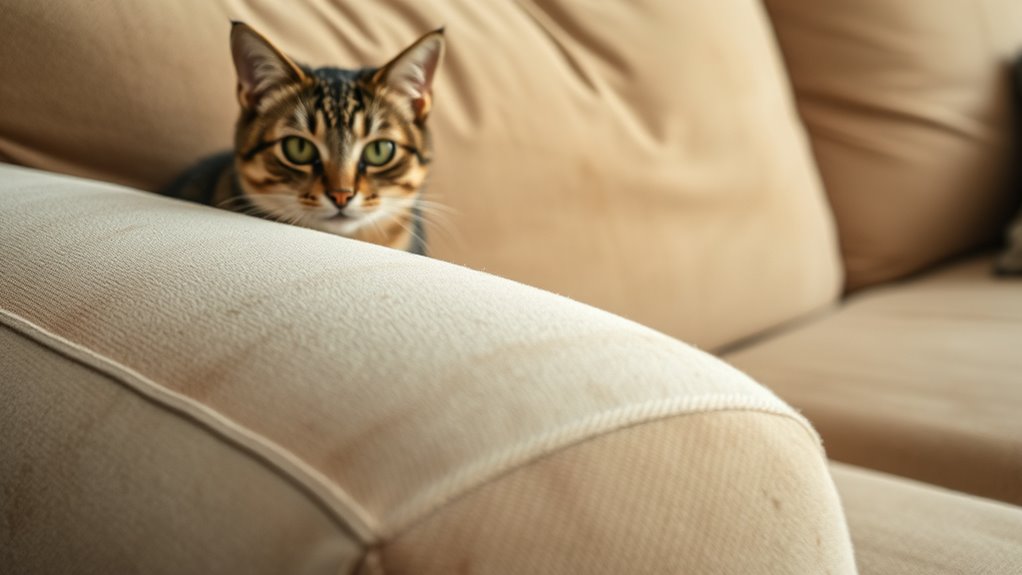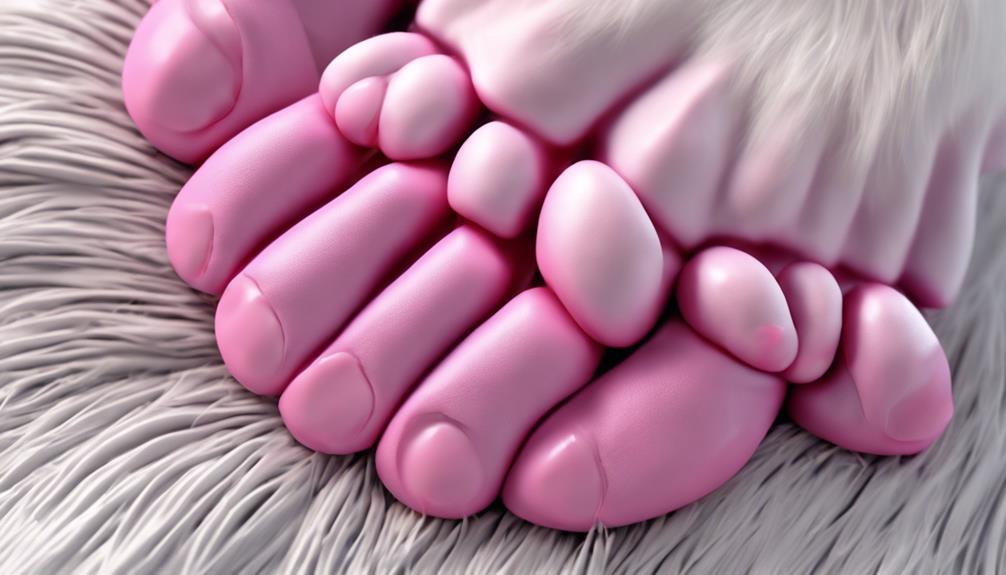If your sofa smells like a rival feline’s territory, it’s likely due to failed litter box and scratching post maintenance. When you don’t scoop the litter daily, or ignore cleaning the scratchers, your cat leaves scent markers that rub off on your furniture. Poor ventilation and lingering odors from dust or dander can also contribute. Maintain regular cleaning, use enzyme cleaners, and ensure enough litter boxes to help prevent this. Stick around to discover more ways to keep your home fresh and odor-free.
Key Takeaways
- Regularly clean and vacuum furniture to remove fur, dander, and scent markers that attract marking behavior.
- Use enzyme-based cleaners to effectively break down and eliminate feline scent residues.
- Provide multiple clean litter boxes to reduce territorial marking on furniture.
- Maintain proper ventilation and use pet-safe odor neutralizers to prevent persistent smells.
- Address scent marking promptly by removing visible markings and cleaning the area thoroughly.

Have you ever contemplated that your beloved feline might be more than just a cute companion? Cats are complex creatures, and their habits can markedly impact your home environment—especially when it comes to odors and cleanliness. If you’ve noticed that your sofa smells like a rival feline’s territory, it’s time to take a closer look at your cat’s hygiene routines. Litter box hygiene is often the root cause of lingering smells, so ensuring it’s clean and inviting is essential. You should scoop the litter box at least once a day, and completely change the litter regularly. Using odor-control litter can also help contain unpleasant smells, making your living space more comfortable. Positioning the litter box in a well-ventilated, easily accessible area encourages your cat to use it consistently, reducing the chances of accidents or avoidance that lead to your furniture absorbing the scent.
Beyond the litter box, scratching post maintenance plays an surprisingly crucial role in controlling odors. Cats naturally scratch to mark territory and keep their claws healthy, but if their scratching posts aren’t kept clean, they can become a source of odor and bacteria. Regularly vacuum or shake out the scratching post to remove loose fur and dust, and wash any fabric or sisal parts with mild soap and water to eliminate accumulated scent buildup. When your cat scratches, they deposit scent markers that can linger and intensify smells if the post is neglected. Keeping it fresh and clean discourages your feline from seeking out other spots—like your sofa—to mark territory, which is often the real culprit behind that unmistakable feline odor. Additionally, understanding environmental factors such as ventilation and humidity can help manage and reduce persistent odors in your home.
Keeping scratching posts clean prevents odors and bacteria buildup, discouraging your cat from marking furniture with scent.
You might also want to contemplate how your cat’s overall environment contributes to the smell. Providing enough litter boxes—ideally one per cat plus an extra—reduces territorial disputes and prevents cats from choosing less appropriate spots to do their business. Use cleaning sprays designed for pet odors, and regularly vacuum or wipe down furniture and carpets to remove hair and dander. If your cat’s scent marking on furniture has become a habit, try using enzyme cleaners that break down the scent molecules rather than just masking them.
In the end, maintaining good litter box hygiene and keeping scratching posts clean aren’t just about cleanliness—they’re about respecting your feline’s natural behaviors and keeping your home smelling fresh. When you prioritize these simple tasks, you’ll find that your sofa no longer smells like a rival feline’s turf, and your home becomes a more inviting sanctuary for both you and your furry friend.
Frequently Asked Questions
Can Scent Glands on Cats Affect Sofa Odors?
Scent glands on cats, known as feline scent glands, can definitely affect your sofa odors. When your cat rubs against furniture, it deposits cat pheromones from these glands, leaving a distinct smell. These natural markers are meant to communicate territory but can linger, making your sofa smell like a rival feline’s scent. Regular cleaning and providing your cat with designated scratching posts can help reduce these odors and keep your furniture fresh.
Do Certain Fabrics Trap Feline Smells More Than Others?
Certain fabric types trap feline smells more than others because of their odor absorption qualities. You’ll find that materials like microfiber and velvet tend to hold onto scents longer, making odors more noticeable. On the other hand, fabrics such as leather or tightly woven upholstery are less absorbent, so they don’t trap odors as easily. Choosing the right fabric can help keep your sofa smelling fresher despite your feline friend’s scent secrets.
How Often Should I Clean My Sofa to Prevent Odors?
Think of your sofa as a garden that needs regular tending. You should clean your furniture regularly—at least once every 1-2 months—to prevent odors from taking root. Proper furniture cleaning not only keeps your space smelling fresh but also acts as a barrier against stubborn feline scents. Consistent cleaning is key for odor prevention, ensuring your sofa remains inviting instead of becoming a battleground for smells.
Are There Natural Remedies to Eliminate Cat Smell From Furniture?
You can tackle cat smell with natural remedies like homemade sprays that blend vinegar, water, and a few drops of essential oil. These help neutralize odors effectively. Additionally, placing odor absorbing plants such as bamboo or peace lilies in your home absorbs airborne smells naturally. Regularly spraying your furniture and adding these plants creates a fresh environment without harsh chemicals, keeping your space smelling clean and inviting.
Can Grooming Habits Influence How Much My Sofa Smells?
Sure, your grooming habits definitely influence your sofa’s scent. If you neglect your litter box or give your cat outdoor access, you’re practically inviting odor to linger. Regular brushing and bathing reduce shedding and odor transfer, keeping your furniture fresher. Plus, if your cat roams outside, they pick up outdoor smells, making grooming even more essential. So, stay consistent—your sofa will thank you with fewer feline fragrances.
Conclusion
Remember, your sofa is more than just furniture; it’s the battlefield of your feline’s territory. When it smells like a rival, it’s a sign of deeper turf battles and unspoken tensions. Cleaning and understanding your cat’s needs can restore peace, turning your sofa back into a sanctuary of comfort and trust. Don’t let the scent of rivalry tarnish your bond—address it now, and reclaim your home as the peaceful kingdom it’s meant to be.










